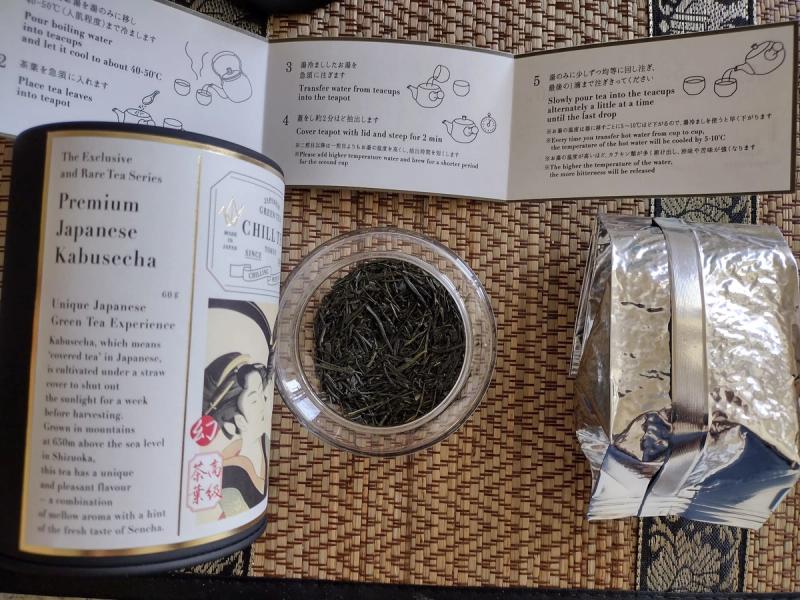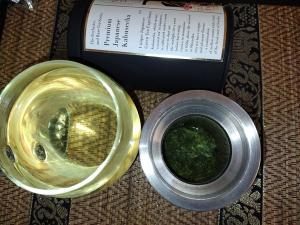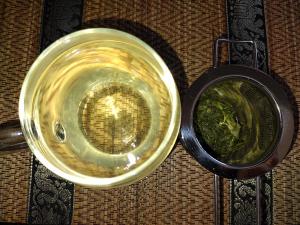Chill Tea's Kabusecha "Hikari"

First look at Chill Tea Tokyo's Kabusecha Hikari: premium packaging includes the tin, foil pouch, and instructions alongside the deep green dry leaves.
Tea Gallery

The first infusion of Kabusecha Hikari yields a delicate pale green liquor, contrasting with the vibrant wet leaves in the infuser. The signature Chill Tea Tokyo tin is visible.

Close-up overhead view showcasing the luminous, pale yellow-green color of the brewed Kabusecha Hikari and the intensely vibrant green of the fully steeped leaves.
Click on an image to enlarge
🍵 Tea Details
- Tea Name
- Kabusecha Hikari
- Type
- green
- Origin
- Narao, Shizuoka
- My Rating
🏪 Where I Got It
How I Brewed It
40-50C for 2 mins as instructed, higher temp and shorter for second.
Hailing from the same high-altitude (650m) Narao region of Shizuoka as its Sencha sibling and cultivated by Mr. Mori, this Kabusecha Hikari is a single-origin, first-flush (Ichibancha) shaded tea. This marked my very first experience with Kabusecha, let alone one positioned at such a premium tier within Chill Tea Tokyo's "Exclusive and Rare Tea Series." Estimating from the gift set price, the Kabusecha Hikari's portion is likely £30+, placing it firmly in the high-end category.
Packaging and Appearance:
Mirroring the Sencha, the tea arrives in an elegant black canister, with the leaves protected inside a vacuum-sealed foil pouch, a detail that immediately signals a commitment to freshness and quality. Upon cutting the seal, the aroma was striking. It was instantly green tea, yet with a surprising and distinct natural sweetness. This was a first for me. Smelling inherent sweetness in dry green tea leaves was unexpected and intriguing. The dry leaves themselves are visually impressive: a deep, vibrant green, showcasing the fine, needle-like shape characteristic of high-quality Japanese processing. They appear uniform and delicately rolled.
Aroma:
Beyond the unique sweet scent of the dry leaves, the aroma when brewed is fresh and clean, slightly vegetal or marine-like, embodying the freshness expected of a first flush. It's less overtly grassy than the Sencha, leaning more towards that subtle sweetness and umami preview.
Brewing and Liquor:
Following the package instructions, I brewed using Brita-filtered water further treated with a Phox softener, cooled meticulously to the recommended 45-50C. The first infusion steeped for 2 minutes. The resulting liquor was a beautiful, clear, very pale yellow-green, textbook for a low-temperature infusion of high-grade shaded tea. The steeped leaves unfurled into impressively vibrant, bright green, largely whole leaf pieces, confirming their quality. The second infusion (60C for 30 seconds) continued to yield a flavourful cup.
Taste and Mouthfeel:
My experience with Kabusecha Hikari was quite different from the Sencha, presenting its own journey. Similar to my initial reaction to the premium Sencha, the Kabusecha didn't immediately 'click' on the first day. The umami and sweetness are undeniably present and forward, a mellow, almost viscous savoury quality intertwined with a gentle sweetness. The mouthfeel is relatively smooth, perhaps hinting at thickness from the amino acids.
However, the defining characteristic was the integration of bitterness. Unlike the Sencha where bitterness provided balance, here it felt almost hidden within the dominant umami and sweetness. It created a mellow, complex, yet somewhat perplexing profile where distinguishing the start and end of each flavour note was challenging. This "hidden bitterness" within the mellow structure was a strange, unfamiliar experience. The aftertaste carries a subtle grassy linger, noticeably less pronounced and rich than the Sencha Midori's finish.
Overall Impression and Value:
Chill Tea Tokyo's Kabusecha Hikari is undoubtedly a high-quality, unique, and technically proficient tea. The freshness, leaf quality, and the prominent umami-sweetness profile are evident. It offers a fascinating glimpse into the effects of shading, resulting in a character distinct from Sencha.
However, while I appreciate the experience and the quality, the unique flavour profile, particularly the way the bitterness integrates, left me pondering. It's an intriguing puzzle, but one I'm still unsure if I fully "like" in terms of personal preference. Given its premium status and high price point, like the Sencha, this falls into the "special occasion" or "exploration" category for me, rather than a regular drink.
I give it a 4 stars. The quality is undeniable, reflecting its exclusive origins and careful processing. However the 4 stars reflects my personal struggle to connect with its unique flavour balance and the resulting value perception at its premium price. It's 100% worth trying for the experience, especially for those curious about high-end Kabusecha or umami-rich teas, and the gift set provided an excellent opportunity. However, its specific, mellow-yet-puzzling character might be more divisive than the more classically balanced premium Sencha.